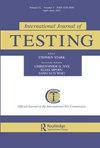Dropping the GRE, keeping the GRE, or GRE-optional admissions? Considering tradeoffs and fairness
IF 1.4
Q2 SOCIAL SCIENCES, INTERDISCIPLINARY
引用次数: 5
Abstract
Abstract In considering whether to retain the GRE in graduate school admissions, admissions committees often pursue two objectives: (a) performance in graduate school (e.g., admitting individuals who will perform better in classes and research), and (b) diversity/fairness (e.g., equal selection rates between demographic groups). Drawing upon HR research (adverse impact research), we address four issues in using the GRE. First, we review the tension created between two robust findings: (a) validity of the GRE for predicting graduate school performance (rooted in the principle of standardization and a half-century of educational and psychometric research), and (b) the achievement gap in test scores between demographic groups (rooted in several centuries of systemic racism). This empirical tension can often produce a local diversity-performance tradeoff for admissions committees. Second, we use Pareto-optimal tradeoff curves to formalize potential diversity-performance tradeoffs, guiding how much weight to assign the GRE in admissions. Whether dropping the GRE produces suboptimal admissions depends upon one’s relative valuation of diversity versus performance. Third, we review three distinct notions of test fairness—equality, test equity, and performance equity—which have differing implications for dropping the GRE. Finally, we consider test fairness under GRE-optional admissions, noting the missing data problem when GRE is an incomplete variable. Supplemental data for this article is available online at放弃GRE,保留GRE,还是GRE可选录取?考虑权衡和公平
摘要在考虑是否在研究生院招生中保留GRE时,招生委员会通常追求两个目标:(a)研究生院的表现(例如,录取在课堂和研究中表现更好的个人),以及(b)多样性/公平性(例如,人口群体之间的平等选择率)。根据人力资源研究(不利影响研究),我们解决了GRE使用中的四个问题。首先,我们回顾了两个强有力的发现之间产生的紧张关系:(a)GRE在预测研究生院成绩方面的有效性(植根于标准化原则和半个世纪的教育和心理测量研究),以及(b)人口群体之间的考试成绩差距(植根于几个世纪的系统性种族主义)。这种经验上的紧张关系往往会给招生委员会带来当地多样性表现的权衡。其次,我们使用帕累托最优权衡曲线来形式化潜在的多样性-绩效权衡,指导GRE在招生中的权重分配。放弃GRE是否会产生次优录取取决于一个人对多样性与表现的相对评价。第三,我们回顾了三个不同的考试公平概念——平等、考试公平和成绩公平——它们对放弃GRE有不同的影响。最后,我们考虑了GRE可选录取下的考试公平性,注意到当GRE是一个不完全变量时,数据缺失的问题。本文的补充数据可在线获取,网址为
本文章由计算机程序翻译,如有差异,请以英文原文为准。
求助全文
约1分钟内获得全文
求助全文
来源期刊

International Journal of Testing
SOCIAL SCIENCES, INTERDISCIPLINARY-
CiteScore
3.60
自引率
11.80%
发文量
13
 求助内容:
求助内容: 应助结果提醒方式:
应助结果提醒方式:


